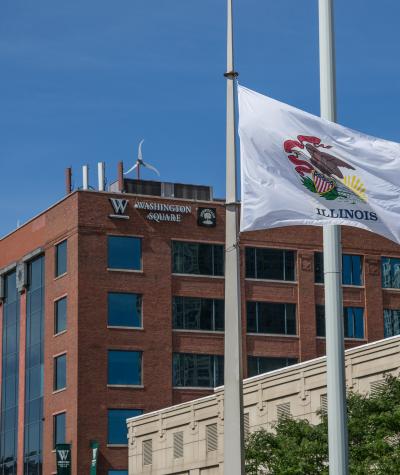On Aug. 28, 2017, Governor Bruce Rauner signed into law SB 1933, a bipartisan bill establishing an automatic voter registration (AVR) system in Illinois. Under the new law, eligible citizens will automatically be registered to vote, or have their registration updated, when they apply for a driver’s license or interact with state agencies for other services, unless they affirmatively opt out. Last year, Demos, a New York-based think tank, found that over 1.13 million new voters in Illinois could be registered within the first year of enacting AVR.
The legislation passed both houses of the Illinois General Assembly unanimously. Governor Rauner vetoed a previous version of the bill last year, citing concerns over the possibility of voter fraud and potential conflicts with federal law. The bipartisan co-sponsors of the legislation amended the bill to address those concerns, aligning the adoption of AVR with implementation of the federal REAL ID Act to ensure voter eligibility and moving the opt-out point to the beginning of the process, rather than the end. The Campaign Legal Center (CLC) has signed onto the Just Democracy coalition’s letter thanking Governor Rauner for his support for this important step in advancing democracy.
Illinois now joins eight other states (Alaska, California, Colorado, Connecticut, Oregon, Rhode Island, Vermont, West Virginia) plus the District of Columbia in adopting AVR. Oregon led the charge by enacting AVR in 2015, and was the only state to implement the program ahead of the 2016 elections. The Beaver State saw a 4.1 percent increase in voter turnout compared to 2012, the largest such gain for any state. In total, 225,796 new Oregon voters were automatically registered in time to vote in 2016, 43.5% of whom ultimately cast a ballot. The effects were even more pronounced for traditionally underrepresented groups in the political process. The Alliance for Youth Action found that 40% of all new automatic voter registrants in Oregon were under 30, while the under-30 turnout rate jumped twenty percentage points compared to 2012. Preliminary analysis also suggests the registration rate for people of color climbed from 53% to 79% between December 2015 and January 2017. A recent Center for American Progress report found that AVR registrants were more likely to live in lower-income and lower-education neighborhoods than the rest of the Oregon voter pool.
In addition to boosting registration rates and voter turnout, AVR may also result in other benefits, including more accurate voter rolls and lower costs. By sharing information automatically and electronically, state agencies can reduce reliance on error-prone paper forms and manual data entry. Registration information can also be kept more up-to-date as voters move. In Oregon, for example, 264,551 voters received address updates through the AVR system prior to the 2016 election. Additionally, AVR can improve efficiency by spreading out the spike in applications that tend to occur just before the registration deadline prior to an election.
In adopting AVR, Illinois joins a movement that appears to be gaining momentum across the country. Currently, 33 states are considering legislation to adopt or expand AVR, according to data compiled by the Brennan Center for Justice. So far this year alone, Rhode Island enacted AVR; the Utah state house passed AVR legislation with bipartisan support, which is currently pending action by the state senate; and the Nevada legislature took steps to place AVR on the ballot as a statewide initiative in 2018. Several pieces of federal legislation have also recently been introduced to expand AVR nationwide, either by requiring states to adopt AVR systems or by providing funding and incentives to do so.
AVR has proved popular with voters themselves. A 2015 YouGov survey found that Americans supported their state automatically registering eligible voters when they visit the DMV by a 54%-35% margin. Last year, Alaska enacted its AVR measure as a ballot initiative that passed with an overwhelming 65%-35% margin.
AVR promises to save governments time and money, ensure greater accuracy, and engage more eligible voters in the political process. CLC commends Illinois for passing this important legislation on a broad, bipartisan basis, and looks forward to additional states moving forward with common-sense reform that strengthens our democracy.
